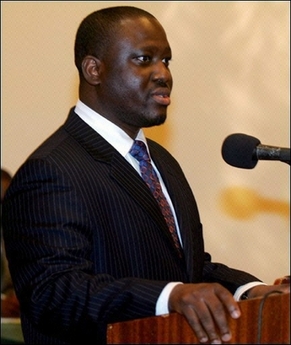Africa
Ivory Coast prime minister survives attack on plane
(AFP)
Updated: 2007-06-30 01:00
 |
Large Medium Small |
 Ivory Coast Prime Minister Guillaume Soro is seen here 12 June 2007. Soro has survived an attack on his plane which killed at least four people in a heavy blow to the divided country's fragile peace process, aides and other sources said.[AFP]  |
Three rockets hit the plane as it was landing at Bouake, the base of Soro's New Forces movement which has governed the north of Ivory Coast after failing to oust President Laurent Gbagbo in 2002, a journalist who was aboard told AFP.
"Four people were killed," Diarra Sanou said by telephone.
Security sources said earlier that at least five people had been seriously hurt.
Soro's personal bodyguard opened fire to secure the airport perimeter, the sources said. Firing continued between the airport and the city for more than an hour after Soro landed before dying down, they added.
One source said the area was under control and the attack seemed to have been "isolated", but warned that violence could break out again. Roads into Bouake had been closed.
Some sources spoke of clashes between New Forces factions, some of which have branded Soro a traitor since he was named prime minister in April after signing a peace deal with Gbagbo.
Ivorian state television in its midday bulletin confirmed that Soro was "unharmed and safe" but gave no details.
Soro had arrived in Bouake to preside over a ceremony restoring the judiciary in company with a dozen magistrates and other officials.
It was to be a key step in the peace process aimed at reunifying the country.
Gbagbo himself is due in Bouake on July 5 to head a disarmament ceremony along with South African President Thabo Mbeki, a leading mediator in the lengthy reconciliation efforts.
In Abidjan, the country's economic capital, security forces and government departments were on the alert in the wake of the attack.
In Paris former colonial power France said it "condemns with the greatest firmness this cowardly attack and reaffirms its solidarity with the whole of the Ivorian nation and people."
France has more than 3,000 troops in the country who have operated alongside United Nations forces to patrol a buffer zone dividing the rebel-controlled north and the government-held south.
The head of the regional Economic Community of West African States (ECOWAS), Mohamed Ibn Chambas, condemned the attack in a statement to AFP in Accra, where an African Union summit opens this weekend.
"We condem this violent attack as it is undermining the peace process supported by the whole international community," he said.
On Wednesday the leading International Crisis Group (ICG) think tank warned there was a long way to go to resolve the fall-out from Ivory Coast's civil war.
The latest peace agreement signed in March in Burkina Faso is "only a first step in the right direction" which helps to remove the spectre of an armed conflict, but lasting peace remains fragile, it said.
It is "more a deal between two sides looking for an escape route that protects their own interests than a compromise which guarantees lasting peace," warned the Belgium-based watchdog in a report released in Dakar and Brussels.
It said that Gbagbo is concerned with remaining in power, while Soro "is anxious to secure his political future in a reunified country".
"Even if correctly implemented, the Ouagadougou agreement will not end the political crisis that has divided Ivorian society," warned ICG.
It called for the power-sharing deal between the two former arch-foes to pass the test of population identification, voter registration, army restructuring and conduct of free and credible elections.
Earlier mediation attempts by France, the United Nations, the African Union and ECOWAS all failed to bring lasting peace in the world's top cocoa grower and regional economic powerhouse.
| 分享按钮 |